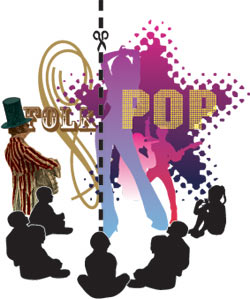|
Children
Don’t Know Folk Songs, Threatening Heritage
downloadable
pdf
Children
in the United States aren’t singing the songs
of their heritage, an omission that puts the nation
in jeopardy of losing a long-standing and rich part
of its identity, a new University of Florida study suggests.

A
recent nationwide survey found school music programs
are allowing generations-old lullabies, and historical
children’s and folk songs to be ignored, with
some teachers replacing them with the latest pop hits.
Today’s
school kids are more likely to know the lyrics to popular
songs, such as Britney Spears’ “Oops!...I
Did it Again” or “Lose Yourself” by
Eminem, than to “Mary Had a Little Lamb”
or “Old MacDonald Had a Farm,” said Marilyn
Ward, who did the research for her doctoral dissertation
in music.
“The
study found that, overall, the vast majority of young
people could not sing patriotic, folk and children’s
songs because teachers who teach them at all frequently
don’t go over the songs enough for students to
learn them,” she said.
Ward
surveyed 4,000 music teachers nationwide from elementary
to high school in the summer and early fall of 2002
about how much they taught and how well their students
knew by memory 100 well-known songs considered representative
of the American heritage.
Research
has shown these songs not only help children learn about
important events but also allow them to more closely
relate to the hardships and joys of their grandparents
and ancestors by stepping into their shoes, Ward said.
To
create a list of 100 representative songs, Ward distributed
written surveys to 223 men and women aged 62 and older
who grew up in 44 states as well as 30 elementary music
specialists at top universities as ranked by U.S. News
& World Report. She then sent written surveys to
4,000 general music teachers listed by the National
Association for Music Education — 80 in each state
— asking how many of their students could sing
these songs from memory. Based on how much time they
had spent teaching each song, the teachers — 1,792
of whom responded — were asked to rate this knowledge
using one of five measures: practically all, most, some,
few or practically none.
Most
of the teachers said that few students would be able
to sing the songs and that they had spent little time
teaching them. Folk songs were the most neglected, followed
by children’s and patriotic songs.
“Although
Americans say that the singing of folk songs and songs
of our heritage is important, we are teaching very few
of them in the schools,” said UF music Professor
Russell Robinson, who supervised the study. “Perhaps
this research will alert educators and parents that
what we say we want for our young people is not necessarily
what we’re teaching.”
Marilyn Ward, marilyn@neflin.org
by
Cathy Keen
|


